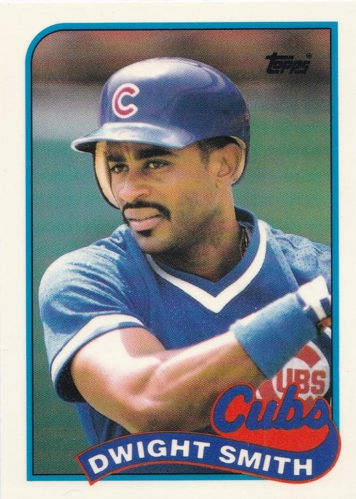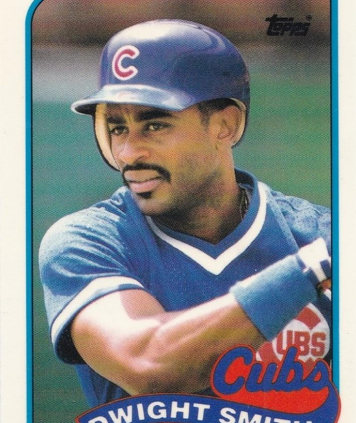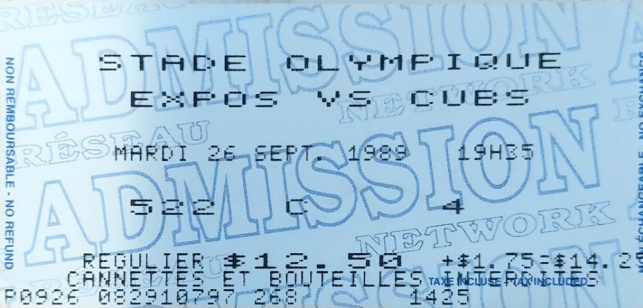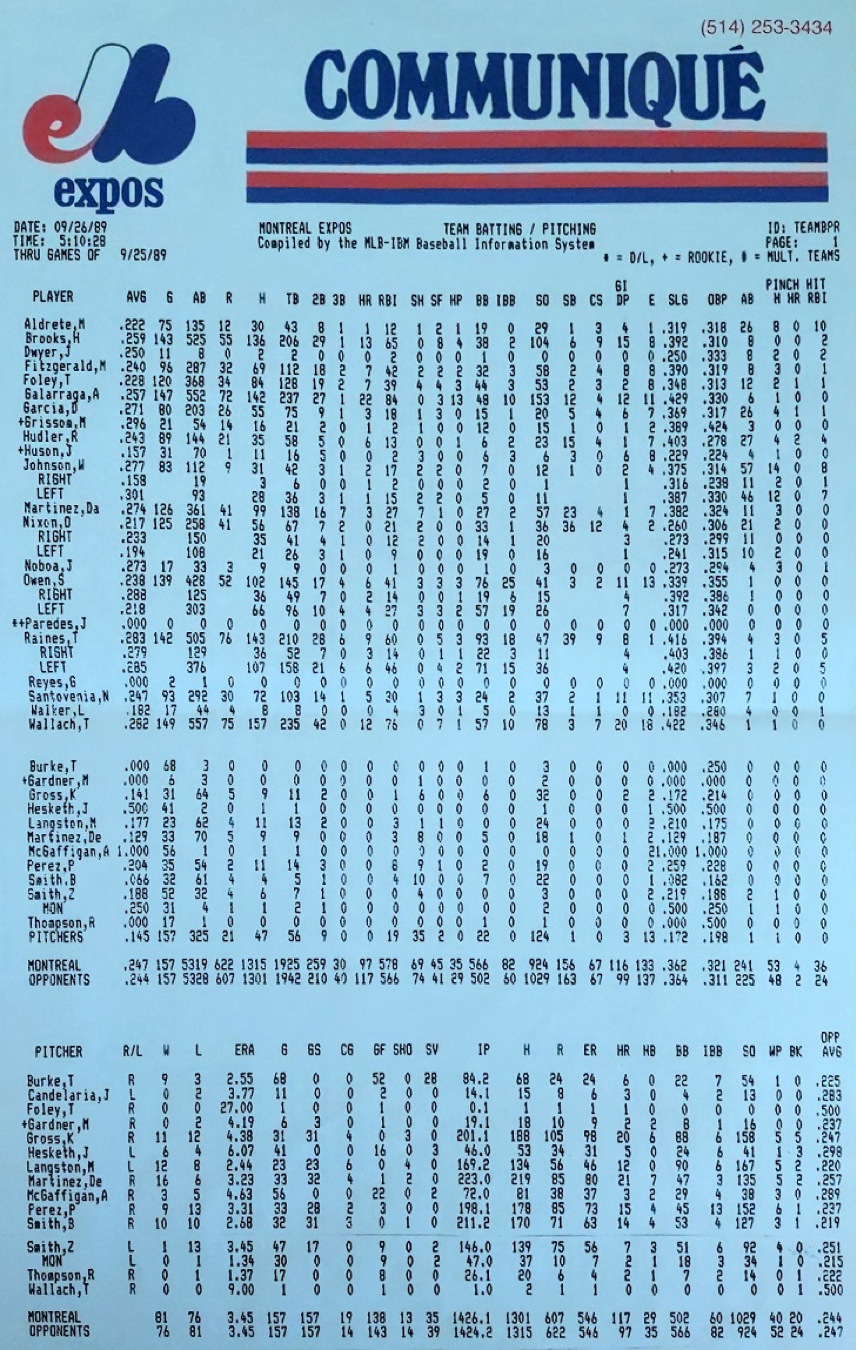September 26, 1989: Cubs clinch NL East on Dwight Smith’s clutch hits
 “The [Chicago] Cubs, who haven’t won a world championship since 1908, have had only one winning season since 1972,” wrote Sports Illustrated’s Steve Wulf in his assessment of the National League East prior to the start of the 1989 season. “You can be certain this will not be their second.”1 Wulf was not alone. Several prognosticators, including The Sporting News and the Associated Press, were convinced that the Cubs were destined to finish no better than fifth place.2
“The [Chicago] Cubs, who haven’t won a world championship since 1908, have had only one winning season since 1972,” wrote Sports Illustrated’s Steve Wulf in his assessment of the National League East prior to the start of the 1989 season. “You can be certain this will not be their second.”1 Wulf was not alone. Several prognosticators, including The Sporting News and the Associated Press, were convinced that the Cubs were destined to finish no better than fifth place.2
The so-called experts could only eat crow on September 26 as the Cubs enjoyed a champagne-soaked celebration in the visitors’ clubhouse at Olympic Stadium. They had just clinched their second division title in six years with a thrilling 3-2 victory over the Montreal Expos, thanks to two consecutive clutch hits by rookie outfielder Dwight Smith.3
The Cubs’ magical run was not without a few bumps in the road. After posting a winning record in April, the team ran into trouble in May when all three starting outfielders went on the disabled list within a week.4 Smith, Lloyd McClendon, and Doug Dascenzo were summoned from the minors to take their place.5 Right fielder Andre Dawson missed the most time – 32 games – but the scrappy Cubs climbed from third to first place during the absence of the 1987 National League MVP.6
Smith hit .384 and knocked in 18 runs while Dawson was on the shelf, and McClendon hit .318 during Mitch Webster’s two-week stint on the DL. The pair of rookies performed so well that after the injured players returned, manager Don Zimmer platooned the left-handed-batting Smith and the righty McClendon in left field for the remainder of the season.7
After a seven-game losing streak in late June, the Cubs were chasing the Expos – not the New York Mets – for first place.8 The Mets had come down to earth after running away with the division in 1988.9
Montreal, boosted by the midseason acquisition of Mark Langston from the Seattle Mariners, went into the All-Star break in first place, 1½ games ahead of Chicago.10 That lead disappeared in early August, and the Cubs and Expos were tied for first place when they met at Wrigley Field for a pivotal three-game set on August 7-9. The Cubs swept the series in dominant fashion, outscoring the Expos 12-4 and grabbing a stranglehold on first place. It was a lead they did not relinquish.
The Cubs suffered another setback in mid-August when their starting catcher, Damon Berryhill, was lost for the season with a shoulder injury. Rather than trade for a veteran backstop, Chicago decided to go with a pair of rookies, Joe Girardi and Rick Wrona.11 Girardi – with a weaker bat but a better throwing arm − usually played against teams that stole a lot of bases.
By the time the Expos and Cubs met in Montreal for a three-game series in late September, Chicago had opened a four-game lead over the St. Louis Cardinals with six games to play. The bottom had completely fallen out of the Expos’ season – they had won only 17 of their previous 49 games to fall nine games behind the Cubs.
Montreal won the series opener in extra innings, keeping Chicago’s magic number for clinching the division at 2.
The Cubs sent their ace, 23-year-old Greg Maddux, to the hill in the middle game of the series. Maddux had won his two previous starts against Montreal, including the crucial August 7 contest that gave Chicago sole possession of first place. The future Hall of Famer, who came into the game with an 18-12 record and a 2.97 ERA, was still three years away from winning the first of four consecutive Cy Young Awards.
The Expos countered with righty Dennis Martínez (16-6, 3.23 ERA). The 35-year-old Nicaraguan had been experiencing a career renaissance in Montreal over the past three years after seeking help in his battle with alcoholism. Martínez went on to even greater success, capped by a perfect game against the Los Angeles Dodgers in 1991.12
Maddux and Martínez cruised through the first inning, with the only baserunner (Smith) reaching on an infield single.
Martínez walked Luis Salazar with one out in the second. After Shawon Dunston hit into a force out, Wrona laced a first-pitch fastball into the left-field corner for a triple. Dunston scored easily, and the Cubs led, 1-0. It was Wrona’s third extra-base hit in 88 career at-bats.
Martínez settled down, retiring the next seven batters. His modest streak was broken when Dunston reached on an infield single to open the fifth; he was erased after Wrona fanned on the front end of a “strike-’em-out, throw-’em-out” double play.
Maddux, meanwhile, limited the Expos to a double and two singles in the first five innings.
With one out in the sixth, Ryne Sandberg doubled off the left-field wall, bringing the red-hot Smith to the plate. The 25-year-old slugger had 10 hits in his previous 17 at-bats. Smith fought off a 2-and-2 pitch from Martínez and blooped an opposite-field single, sending Sandberg home with the Cubs’ second run.
The Expos came roaring back in the bottom half of the inning. Rookie Marquis Grissom13 and Andrés Galarraga opened the frame with back-to-back singles, and Hubie Brooks followed with an RBI single, cutting the Chicago lead in half.
Moments later, the WGN telecast informed viewers that the Pittsburgh Pirates had defeated the Cardinals, 4-1. The Cubs’ magic number was down to 1.
Three batters later, Expos catcher Nelson Santovenia drove in Galarraga with a sacrifice fly and the game was tied, 2-2.
Both Martínez and Maddux had one-two-three innings in the seventh.
In the eighth, Sandberg started a two-out rally with a single. He was off and running on a 1-and-1 pitch from Martínez when Smith pulled a line-drive single to right field. Brooks, who had been converted into an outfielder at the beginning of the previous season, fumbled the ball as Sandberg approached third.14 Third-base coach Chuck Cottier waved Sandberg home and he scored standing up, giving the Cubs a 3-2 lead. “He was alert to wave me in,” Sandberg said after the game. “I wasn’t expecting to score on the play.”15
Maddux recorded a key shutdown inning, retiring the Expos in order in the bottom half of the eighth.
The Expos did not go quietly in the ninth. Tom Foley singled to open the inning, and shortly after Otis Nixon pinch-ran for him, Zimmer brought Girardi in to catch in an attempt to neutralize the speedster.
Santovenia sacrificed Nixon to second, putting the potential tying run into scoring position. As soon as Wallace Johnson was announced as the pinch-hitter for the light-hitting Spike Owen, Zimmer called for his stopper, Mitch Williams.
“Wild Thing” had been acquired from the Texas Rangers in the previous offseason in a nine-player deal that saw Rafael Palmeiro leave the Windy City. The deal had been criticized in Chicago by those who were upset that the Cubs had given up a young hitter of Palmeiro’s caliber.16 But the deal paid dividends in 1989, as Smith offset the loss of Palmeiro17 and Williams helped stabilize the Cubs bullpen.18
Displaying his usual wildness, Williams ran the count to 3-and-2 before retiring Johnson on a popup for the second out. With pinch-hitter Mike Fitzgerald at the plate, Nixon stole third without a throw from Girardi.19
On a 1-and-2 fastball from Williams, Fitzgerald tried to check his swing, only to have home-plate umpire Dutch Rennert raise his right arm to indicate strike three.20 The Cubs were headed to the postseason for just the second time since 1945.
It was a remarkable accomplishment for a team that, aside from Sandberg and Maddux, was laden with question marks when the season began. “Maybe we’ve got the fifth best talent in the division,” said Mark Grace, who had a breakout season.21 “But we’ve got it here [pointing to his heart].”22
Zimmer got the most out of the Cubs using an aggressive style of play, earning him the NL Manager of the Year Award.23 “This is my 41st year in baseball,” Zimmer proclaimed. “But this tops everything I have ever done in the game.”24 It turned out to be his only division title in 13 seasons as a big-league manager.25
In the last month of the regular season, Smith led all Cubs regulars in batting average (.439), on-base percentage (.513), and slugging (.576). Not bad for a guy who was one of the first cuts in spring training and was sent to Iowa to start the season.26 “Did I dream this?” Smith said. “Yes! And my dream came true.”27
Unfortunately for the Cubs, the dream came to an abrupt halt. In the NLCS, the potent bats of Will Clark and Matt Williams were too much for Chicago’s pitching, and the San Francisco Giants romped to a four-games-to-one victory. The Cubs’ 81-year World Series drought continued.
Long-suffering Cubs fans were forced to mutter “Wait ’til Next Year” 27 more times. Finally – mercifully − the Curse of the Billy Goat came to an end in 2016.
Author’s Note
Despite being heartbroken by the Expos’ late-season collapse, the author made a last-minute decision to venture down to Olympic Stadium on September 26 in the hopes of seeing the Cubs clinch the division. After the game, an exuberant Harry Caray celebrated by grabbing the Expos’ game notes from off his desk and tossing them out of the WGN booth. The author retrieved one of the sheets (shown below) and kept it as a souvenir.
(Click image to enlarge)
Acknowledgments
This article was fact-checked by Thomas J. Brown Jr. and copy-edited by Len Levin.
Sources
In addition to the sources cited in the Notes, the author consulted Baseball-Reference.com, Retrosheet.org, and the SABR biographies of Dwight Smith and Dennis Martínez. Unless otherwise noted, all detailed play-by-play information for this game was taken from the YouTube video of the game.
https://www.baseball-reference.com/boxes/MON/MON198909260.shtml
https://www.retrosheet.org/boxesetc/1989/B09260MON1989.htm
Photo credit
Dwight Smith, courtesy of the Trading Card Database.
Notes
1 Steve Wulf, “Who’s the Enemy?” Sports Illustrated, April 5, 1989: 74.
2 Andrew Bagnato, “Cubs Bubble Over with Emotion,” Chicago Tribune, September 27, 1989: 4-10.
3 Smith went 3-for-4 in the game, raising his batting average to .325. His Win Probability Added (WPA) in the game was 0.410, the highest for all players. Mitch Williams recorded the second-highest WPA for the Cubs (0.264).
4 The three injured regulars were right fielder Andre Dawson, rookie center fielder Jerome Walton, and left fielder Mitch Webster.
5 Joe Mooshil (Associated Press), “‘The Greatest Year of My Life,’” Rockford (Illinois) Register Star, September 27, 1989: C-1.
6 Dawson won the 1987 NL MVP Award in his first season with the Cubs after spending the first 11 years of his big-league career with the Montreal Expos. He led the NL in home runs (49) and RBIs (137) in 1987.
7 Mooshil, “‘The Greatest Year of My Life.’”
8 The Cubs were in first place for 111 days in 1989. Other than the Cubs, the Expos spent the most time in first place in the NL East (54 days).
9 The Mets went 100-60 in 1988, finishing 15 games ahead of the second-place Pittsburgh Pirates. The Expos finished in third place, 20 games behind the Mets. The Cubs were fourth, 24 games out of first.
10 The Expos gave up three pitchers to acquire Langston and a player to be named later. One of those pitchers was future Hall of Famer Randy Johnson.
11 Mooshil, “‘The Greatest Year of My Life.’”
12 Despite showing great promise, Martínez posted a 4.16 ERA with the Baltimore Orioles from 1976 to 1986. He entered rehab in December 1983. Martínez had his best years with the Expos, going 100-72 with a 3.06 ERA from 1986 to 1993.
13 Grissom was playing in his 22nd career game. He made his major-league debut on August 22.
14 The Expos moved Brooks from shortstop to the outfield because of his below-average defense. He was not pleased at the shift to the outfield. “I hope it doesn’t come to the point where I have to come out of a game in the late innings for defense,” Brooks said in March 1988. Ian MacDonald, “Brooks Still Uncomfortable with Move to Outfield,” Montreal Gazette, March 19, 1988: H-4.
15 Carrie Muskat, “Gambling Cubs Stop Expos, 3-2,” Rockford Register Star, September 27, 1989: C-1.
16 Jerome Holtzman, “Calm Down Palmeiro Fans, It Was a Good Deal for the Cubs,” Chicago Tribune, December 11, 1988: 3-6.
17 Palmeiro hit .307 and collected 2.3 Baseball-Reference Wins Above Replacement (bWAR) as the Cubs’ primary left fielder in 1988. He hit .275 with 8 homers and 64 RBIs in 156 games with the Rangers in 1989 (2.6 bWAR). Smith hit .324 with 9 homers and 52 RBIs in 109 games in 1989 (2.3 bWAR). Webster also chipped in with a .279 average, 2 homers, and 10 RBIs in 45 games in left field.
18 The Cubs used veteran Goose Gossage as their closer in 1988. (He turned 37 in the middle of that season.) He posted a 4.33 ERA with 13 saves in 23 opportunities that season. Williams led the NL in appearances (76), was second in saves (36), and recorded a 2.76 ERA in 1989. Les Lancaster also helped out immensely in the bullpen; he had a career year, going 4-2 with a 1.36 ERA in 42 appearances.
19 Fitzgerald was pinch-hitting for Martínez. It was Nixon’s 37th stolen base of the season.
20 Andrew Bagnato, “Cubs Rise Again in East,” Chicago Tribune, September 27, 1989: 4-1.
21 In his second big-league season, the 25-year-old Grace hit .314 with 13 homers, 79 RBIs, and 14 stolen bases.
22 Bob Verdi, “The Monsters Mashed, Cubs Bubble Up with Glee,” Chicago Tribune, September 27, 1989: 4-1.
23 Verdi, “The Monsters Mashed, Cubs Bubble Up with Glee.”
24 Associated Press, “Cubs Clinch NL East By Beating Expos 3-2,” Atlanta Journal and Constitution, September 27, 1989: C-5.
25 Zimmer was fired in May 1991 when the Cubs got off to a slow start. He also served as interim manager of the New York Yankees for the first 36 games of the 1999 season. He spent 25 years as a coach in the majors, retiring after the 2006 season.
26 Smith (2.3 bWAR) finished second in NL Rookie of the Year voting behind his teammate, Jerome Walton (1.9 bWAR). Smith’s rookie season turned out to be the best season of his eight-year career. He hit .275 with 46 homers and 226 RBIs in 1,807 career at-bats. Held back in part by his below-average defense, Smith never exceeded the 343 at-bats he had in 1989. He won a World Series with the 1995 Atlanta Braves. Smith was mainly used as a pinch-hitter that season.
27 Bagnato, “Cubs Rise Again in East.”
Additional Stats
Chicago Cubs 3
Montreal Expos 2
Stade Olympique
Montreal, QC
Box Score + PBP:
Corrections? Additions?
If you can help us improve this game story, contact us.




